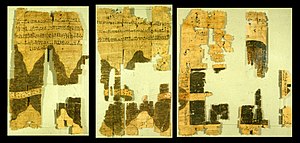| Turin Papyrus Map | |
|---|---|
 Fragments of Turin papyrus | |
| Size | length: 2.1 meters width: 41 cm |
| Created | c. 1150 BCE by Amennakhte |
| Discovered | before 1824 Egypt |
| Present location | Turin, Piedmont, Italy |

The Turin Papyrus Map is an ancient Egyptian map, generally considered the oldest surviving map of topographical interest from the ancient world. It is drawn on a papyrus reportedly discovered at Deir el-Medina in Thebes, collected by Bernardino Drovetti (known as Napoleon's Proconsul) in Egypt sometime before 1824 and now preserved in Turin's Museo Egizio. The map was drawn around 1150 BCE by the well-known Scribe-of-the-Tomb Amennakhte, son of Ipuy. It was prepared for Ramesses IV's quarrying expedition to the Wadi Hammamat in the Eastern Desert, which exposes Precambrian rocks of the Arabian-Nubian Shield. The purpose of the expedition was to obtain blocks of bekhen-stone (metagraywacke sandstone) to be used for statues of the king.